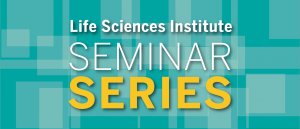Presented By: Life Sciences Institute (LSI)
LSI Seminar Series: Michael Birnbaum, Ph.D., Massachusetts Institute of Technology
Decoding and reprogramming immune recognition

Abstract:
The immune system relies on T cells to distinguish between normal cells and cells altered by infection or cancer. The T cells must integrate signals from their environment in deciding what cells to kill or to spare. This diversity can make determining exactly what is recognized during an immune response extremely challenging. My lab combines protein engineering, combinatorial biology, structural biology and immunology to better understand and then manipulate immune recognition. We aim to find what is recognized during the course of successful immune responses, what antigens should be targeted in treatments and how to better design cell-based immunotherapies.
About the Speaker:
Michael Birnbaum is an assistant professor of biological engineering at MIT. He received his bachelor's degree in chemical and physical biology from Harvard University and his Ph.D. from Stanford University in 2014. There, he worked under K. Christopher Garcia and studied the molecular mechanisms of T cell receptor recognition, cross-reactivity and activation. After postdoctoral work in Carla Shatz’s group at Stanford, supported by a Helen Hay Whitney Postdoctoral Fellowship, Professor Birnbaum joined MIT and the Koch Institute in 2016. During his tenure at the Koch Institute, Birnbaum has received the AACR-TESARO Career Development Award for Immuno-oncology Research, a Packard Fellowship in Science and Engineering, and a V Scholar Grant from the Jimmy V Foundation.
The immune system relies on T cells to distinguish between normal cells and cells altered by infection or cancer. The T cells must integrate signals from their environment in deciding what cells to kill or to spare. This diversity can make determining exactly what is recognized during an immune response extremely challenging. My lab combines protein engineering, combinatorial biology, structural biology and immunology to better understand and then manipulate immune recognition. We aim to find what is recognized during the course of successful immune responses, what antigens should be targeted in treatments and how to better design cell-based immunotherapies.
About the Speaker:
Michael Birnbaum is an assistant professor of biological engineering at MIT. He received his bachelor's degree in chemical and physical biology from Harvard University and his Ph.D. from Stanford University in 2014. There, he worked under K. Christopher Garcia and studied the molecular mechanisms of T cell receptor recognition, cross-reactivity and activation. After postdoctoral work in Carla Shatz’s group at Stanford, supported by a Helen Hay Whitney Postdoctoral Fellowship, Professor Birnbaum joined MIT and the Koch Institute in 2016. During his tenure at the Koch Institute, Birnbaum has received the AACR-TESARO Career Development Award for Immuno-oncology Research, a Packard Fellowship in Science and Engineering, and a V Scholar Grant from the Jimmy V Foundation.